#ITS HORATIO HORNBLOWER
Text
Help one of my favorite 90s A&E dramas doesn't have a published soundtrack I can only find the end title track on the composer's SoundCloud 😭
Glory in this old slideshow video with two of the songs grabbed from the show and random pictures of random characters:
youtube
14 notes
·
View notes
Text
tell me you're thinking what i'm thinking
#i'm sorry but the looks#the kneeling#the shot of edward from the bottom upwards#its giving me ideas#hornblower#horatio hornblower#edward pellew#hornblower series#robert lindsay#ioan gruffudd#hornblower/pellew#hornblower video
56 notes
·
View notes
Text
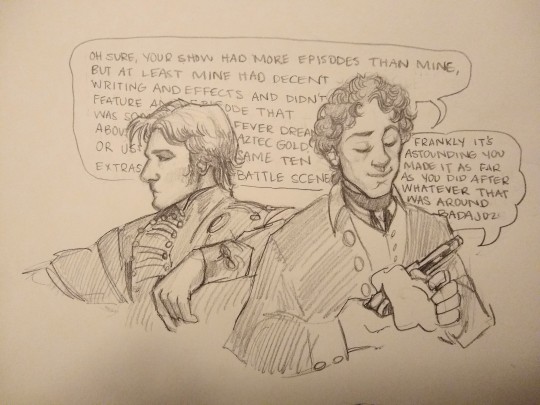
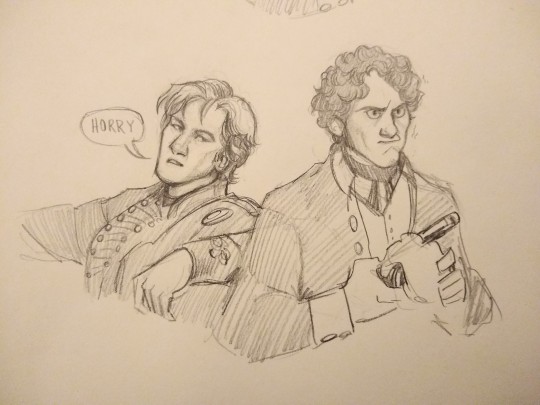
Transcript:
Horatio: (a lot of words about why Hornblower is the better show)
Richard: Horry
#hard to argue with that Horatio#my husband didn't think this was funny#richard sharpe#horatio hornblower#ioan gruffudd#sean bean#hornblower and sharpe best frenemies forever#look i know its chaotic on my blog rn but im in between manuscripts and my brain is like a ferret let out of a cage
245 notes
·
View notes
Text
i have genuinely so many thoughts about how the book Lieutenant Hornblower was adapted and how most of the changes work, when accounting for the fact it must necessarily leave Bush's POV in order to work as television, and how those changes end up fucking over Bush's character in the movies, and how he was further pilfered by the series' decision to maintain characters like Styles and Kennedy. There is so much going on in there. Unfortunately, I don't yet own a copy of Lieutenant Hornblower, and having to constantly borrow it from my library is a faff and prevents me using post its to mark important passages. :(
#i also last read lt hornblower over a year ago at this point#analysing the intersection of bush and kennedy is particularly ripe since kennedy DOES NOT EXIST in that book#and barely exists in the book prior. he's in two chapters. he has like 5 lines of dialogue. he probably gets killed in france#but in Lt you can understand the impulse! because other than bush and buckland? there are two other lts who arent important#so scrapping them in favour of an existing character you cobbled together for the series? yeah! yeah!!!#but they can't give archie the fate of either of the scrapped lts. bc itd be utterly ignomious#one of them gets cut in half by a cannonball. the other dies offscreen during the prisoners revolt on the renown#so they shift the circumstances of the firsts' death to a sequence with bush (the anchor thing)#and they alter the latter to remove archie from canon before he completely breaks the events of Hotspur#but THEY ALSO take actions from bush! and give them! to archie!#and it has a marked effect on bush's character in those two movies!#and when loyalty/duty are more “faithful” to the books re: bush's characterisation its jarring!#*shaking the books* i have so many thoughts#hornblower#“what does styles have to do with it” changes how he relates to the crew.#also they give the cradling bush scene to styles instead of horatio which is Funny as hell but also ;-;#it has a completely different tone but thats the stand in! for horatio calling for him tenderly!#but they couldn't give that scene to horatio because he was about to have a similar thing with archie. :(
22 notes
·
View notes
Text
Going fucking insane over the significance of names in Hornblower once again and I have no one to tell. The autism is winning. But my god I can dissect all of an even chance
#horatio hornblower#hornblower#archie kennedy#jack Simpson#its a hyperfixation that has lasted for years and i am insufferable about it#its the autism
46 notes
·
View notes
Photo






I have no idea what to title this gifset so I’ll just leave it here.
#yes i threatened a photoset and went one better#hornblower#paul mcgann#jamie bamber#ioan gruffudd#nicholas jones#hornblower: mutiny#hornblower: retribution#hornblower: loyalty#hornblower: duty#what does it say about me that i knew exactly where to find all of these?#help#my gifs#william bush#archie kennedy#horatio hornblower#lt buckland#william bush wednesday#the mcgann tongue needs its own tag
148 notes
·
View notes
Text
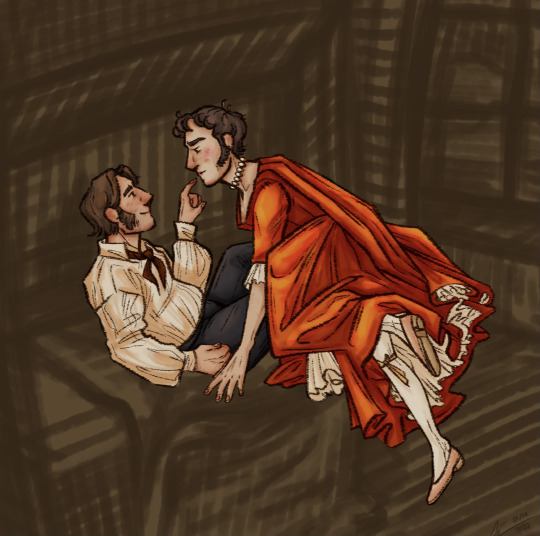
once again I have been utterly captivated (to the point of illustration!) by one of @sanguinarysanguinity's hornblower fics!
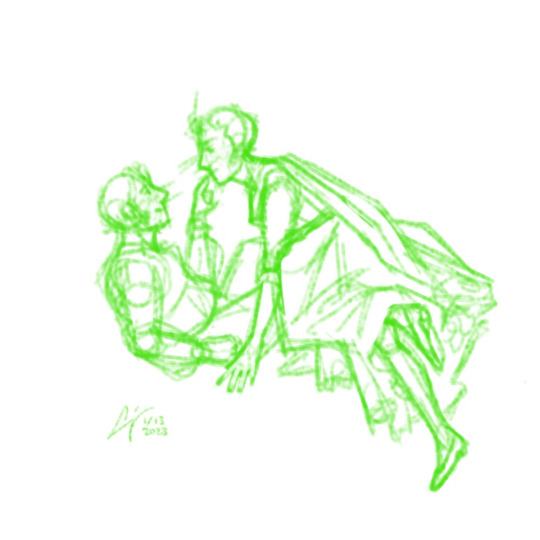
bush's face was really cute in the sketch so you get to see that as well
#em draws stuff#hornblower#william bush#horatio hornblower#suggestive#zoom IN I spent a great deal of time rendering things that don't show up as well on the small screen#I wasn't even finished reading the fic before I realized that I had to Draw Something About It#and it was a million different kinds of fun to get to draw!#gowns of this scale aren't really my strong point but this one came together fairly well and I do love to draw color-change satin#over the last few years I have drawn quite a few Hornblower Images but this one might be a favorite!#on account of both it and its source material just causing me to be Full of Joy
43 notes
·
View notes
Text
have you ever seen a protestant guy and be like. i can fix him. i can make him catholic.
4 notes
·
View notes
Photo

happy pride etc
#oKAY take 2#horatio hornblower#william bush#i cragged bush's face up a bit and reworked some stuff i disliked#its still not 'clean' obvs#but i do like it more#my art
30 notes
·
View notes
Text
Colin Metzer on Tiktok once again channeling Styles energy 🤣🤣🤣🤣
@ariel-seagull-wings @twice-told-tales @captain-dad @gone-grl-gone
14 notes
·
View notes
Text


Thomas Cochrane
“Epitome of the daring, dashing Naval officer. A Radical who fought for parliamentary reform and against corruption, a Naval hero known for his boldness and inventive tactics (look up the capture of the El Gamo!) and clashes with practically everyone he ever worked with, a handsome 6ft+ tall redhead who would go on to earn such sexy nicknames as "the Sea Wolf", (allegedly) framed for fraud and stripped of his career by his political enemies, and his adventures have been the basis for centuries of fictional Naval heroes, including Horatio Hornblower and Jack Aubrey. In his late teens, convinced himself that pain was imaginary. I can't really talk about his post-Napoleonic wars adventures in the Napoleonic wars poll, but that's a LOT.”
Antoni Amilkar Kosiński
"its very sexy to constantly argue with everyone and demand to be discharged from the military every couple of months but then when granted discharge still come back in the time of need <3”
16 notes
·
View notes
Text
A common apologia for STAR TREK — particularly TOS, but extending to the newest shows as well — is that it wants or tries to be progressive, but is tripped up by the writers' unconscious biases or the ostensibly more backward social attitudes of its time (whatever time that may be). This argument is somewhat perplexing because STAR TREK has never been what you'd call subtle in expressing its liberal imperialist values, either in 1966–1968 or now.
The core of STAR TREK, which is explained clearly in Roddenberry's pitch and the TOS writer's bible (excerpted at some length in Stephen Whitfield's THE MAKING OF STAR TREK, inter alia), is a hybridization of Horatio Hornblower, the C.S. Forester adventure novels about a heroic British naval officer during the Napoleonic wars, and the American Western, a genre that still dominated a big swath of American TV drama in the period when STAR TREK was conceived. Roddenberry himself had previously written for some of those shows, in particular HAVE GUN, WILL TRAVEL, and his pitch line for STAR TREK was "WAGON TRAIN to the stars."
To its credit, STAR TREK ended up being about more than just that, but Roddenberry was very clear that at heart, the series was about extending the conquest of the American frontier to the stars. Of the Enterprise and the other ships of its class, Roddenberry said:
In addition to the twelve Starships, there are lesser classes of vessels, capable of operating over much more limited distances. They are involved in commercial ventures, survey work, archaeological expeditions, medical research, and so on. The Starships are the heavy cruisers, the ones which can best defend themselves as they probe farther and farther out, opening new areas … and then the others follow. [Whitfield, 204; emphasis added]
Because TOS avoids saying anything very substantive about civilian life and government outside of Starfleet, we actually know very little about factors may be driving this wave of colonialism. If Earth in the TOS-era is a post-scarcity paradise (which, it should be noted, the original show does not ever actually say), why leave home for a riskier, hardscrabble life on worlds like Rigel XII ("Mudd's Women") or Cestus III ("Arena")? Part of it is plainly capitalist interests: There are explicitly opportunities to strike it rich discovering or exploiting valuable resources (or fleecing those who have or hope to, as Harry Mudd does). The Federation is also keen to cement its political hold on worlds that are near the borders of rival empires; the plot of "The Trouble with Tribbles," for example, hinges on the Federation's determination to colonize Sherman's Planet, which is also claimed by the Klingon Empire.
However, these plot details are to some extent beside the point: The premise of STAR TREK, and of most Westerns, is that the importance and heroic necessity of colonizing and "developing" the frontier, bringing (white) civilization to the "savage" wilderness, is self-evident.
Much of STAR TREK is predicated on concepts of "social evolution," the idea that there are a series of consistently defined hierarchical stages from the primitive to the advanced. TOS often states this quite explicitly, but it has remained a key feature of the STAR TREK premise up to the present. This process of advancement is described as both natural and a matter of moral urgency: Kirk rails against the "stagnation" of less-advanced societies, and on multiple occasions argues that the importance of reversing stagnation (or devolution) justifies violating the Prime Directive with dramatic interventionist action to put a civilization back on what he considers the proper track.
The concepts of social evolution STAR TREK espouses are fundamentally racist — it's a philosophy that rationalizes colonial exploitation (and in the real world even slavery) — and play into the franchise's virulent anti-indigenous attitudes. Indeed, STAR TREK frequently takes an openly contemptuous view of "primitive" peoples, who in TOS are often presented as simpletons, either kindly child-men (e.g., "The Apple") or dangerous savages driven by quasi-animal cunning (as with some of the characters in "A Private Little War"). Probably the ugliest example in TOS is "The Paradise Syndrome, where Kirk loses his memory and falls in with a society of American Indians transported centuries earlier to a distant planet; the story emphasizes that, even deprived of the knowledge and technology of his century, Kirk is still the intellectual superior of the people around him (who of course are played by white actors in redface). However, this a recurring theme throughout STAR TREK: Indigenous species are consistently presented as something less than people unless their stage of advancement approximates that of 20th century Earth (as with the Roman proconsul in "Bread and Circuses," who is one of the very few indigenous "primitives" to be credited with any kind of intellectual sophistication). The application of the Prime Directive (which is wildly inconsistent and honored more in the breach than in the observance) is based not on respect for cultural differences, but on a patronizing desire to "protect" indigenous pre-warp civilizations from ideas that their primitive minds can't yet handle.
STAR TREK pays lip service to the idea of cultural and racial diversity, and the Vulcan slogan (in the third season of TOS) "Infinite Diversity in Infinite Combinations." However, what it most consistently espouses is the importance of ensuring the march of social evolution along orthodox lines and the eventual absorption of other races, cultures, and species into the Federation's (white American liberal) ideas of socioeconomic and technological progress. As Kirk says to Ayelborne in "Errand of Mercy":
KIRK: Gentlemen, I must get you to reconsider. We can be of immense help to you. In addition to military aid, we can send you specialists, technicians. We can show you how to feed a thousand people where one was fed before. We can help you build schools, educate the young in the latest technological and scientific skills. Your public facilities are almost nonexistent. We can help you remake your world, end disease, hunger, hardship. All we ask in return is that you let us help you. Now.
"Errand of Mercy" is notable in that Kirk's condescension toward the Organians proves to be ill-founded: What he and Spock assumed was a stagnant, primitive society is actually a kind of backyard bird feeder maintained by a vastly more advanced species that is trying very hard to be patient as Kirk and the Klingons strut around making pronouncements. At the end of the episode, Kirk admits openly that he's embarrassed at how badly he misread the situation. However, this doesn't ultimately lead him to question his presumptions about social progress; he simply admits that in this specific case, they were misapplied.
The result of "Errand of Mercy," as revealed in the second season of TOS, is a peace treaty between the Federation and Klingons that makes the show's endorsement of colonialism and economic imperialism that much clearer: As we're told in "The Trouble with Tribbles," under this new treaty, if there is a territorial dispute over a newly discovered or colonized world, "one side or the other must prove it can develop the planet most efficiently," with the ostensibly benevolent and freedom-loving Federation and the ostensibly "brutal and aggressive" Klingon Empire vying to determine who will be permitted to exploit that world and its resources. The exact role of the Organians in the framing of this treaty is unclear — they have no need of or interest in Federation-style economic development, and nothing in "Errand of Mercy" suggests that they see much value in it, although the Organians do say they find the prospect of a shooting war between the Federation and the Klingon Empire both morally objectionable and "intensely painful" — but its result is to more firmly establish the Cold War conflict between the Federation and Klingons as the competition of two rival colonial powers for control of valuable territory and resources. Their conflict is a primarily economic one, not really substantively based on what Kor calls the "minor ideological differences" between the two empires, which both Kor and the Organians regard as incidental. (Kirk takes issue with that contention, but as previously noted, Kirk has more than once used the explicit threat of planetary genocide to get what he wants, so Kor probably has a point here!)
Later STAR TREK shows are sometimes more self-conscious about these values, but they seldom actually question them, and there's really only so far that STAR TREK can move these load-bearing narrative elements without becoming something really fundamentally different than it is. Moreover, DISCOVERY, STRANGE NEW WORLDS, and PICARD have seemed committed to doubling down on many of the franchise's more disturbing ideological elements, while attempting to paper over viewer unease with appeals to nostalgia, faux-patriotism, and sentimentality.
#teevee#star trek#star trek tos#the making of star trek#gene roddenberry#stephen whitfield#errand of mercy#organians#the paradise syndrome#anti-indigenous racism
14 notes
·
View notes
Text

Also when I read Mr. Midshipman Hornblower and Lieutenant Hornblower you can bet that I'm going to incorporate at least something into my mckirk fics. (The same for Aubrey/Maturin series, but I already have hcs based on that thanks to the film - because Kirk offering McCoy the whole universe with its fauna and flora to study is chef's kiss.) (We'll see if I'll be able to keep my "McCoy's mother named him Horatio because she read these books" headcanon lol)
I found these in a second-hand bookshop (they also appear unread), and even if it turns out I'm too old for them and missed my chance enjoying them, they're still worth it for the covers and the way they're so carefully made.
#mccoy the scientist is the best#gonna refamiliarize myself with hamlet too so i can see how horatio is used in that one too#leni's nonsense
4 notes
·
View notes
Text
thinking about the hornblower/bush pleading paragraph again and being reminded of a scene earlier in that same book where hornblower is trying to tell bush about how he can navigate and demonstrating the math for him and all bush can do is nod dumbly and admire hornblower's delicate and nimble hands
#not a direct quote i dont have the book on hand despite my attempts to find a copy. i gotta contact that bookstore#but its an early on chapter like 7 or so in lt hornblower and it was the first bit where i went OH I SEE NOW#cause id watched most of the show and had gotten 0 hornblower/bush energy from mutiny/retribution#and then i read lt hornblower and went oh! i see where you fuckers get it from actually. i see the nucleus of it here#lt hornblower is fully the gayest of the novels (of the ones i read which was through till flying colours)#next gayest was probably flying colours. when i finally read lord hornblower we'll see where that figures#but i assume lord hornblower WILL rank on the gay list. most of the books do not in the slightest#yknow actually beat to quarters and ship of the line rank too just bc of how often hornblower goes#'damn my lieutenant (not bush) is an attractive man. im jealous of him' are you horatio? something you wanna tell class#idr the name of the lieutenant but his entire role is to be hot and lean and good with women#so those rank. the others dont though these bitches got nothing#we may give a partial point to midshipman for having the character of archie kennedy for all of 6 lines over two chapters#where in his first appearance its just the two of them being dumb theatrical for no reason. its very cute
4 notes
·
View notes
Text

#horatio hornblower#hornblower#our flag means death#pirates#the golden age of sail#golden age of piracy#please its such a problem
11 notes
·
View notes
Photo

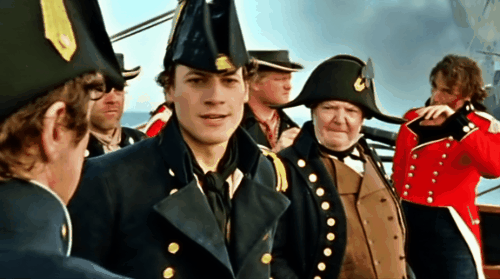
Aww, bless. Look at him, he’s so happy and proud.
Bush is great when he’s sexy and growly but sometimes he can be so adorable you just want to squish him.
#hornblower#hornblower: loyalty#paul mcgann#ioan gruffudd#greg wise#tony haygarth#william bush#horatio hornblower#andre cotard#prowse#william bush wednesday#the transcript i found online and probably the dvd subtitles too think it's 'every shot tolled'#which makes no sense#the phrase is ‘every shot told’ as in it hit its mark#which is what bush is saying#tags brought to you by the pedant society#my gifs
65 notes
·
View notes